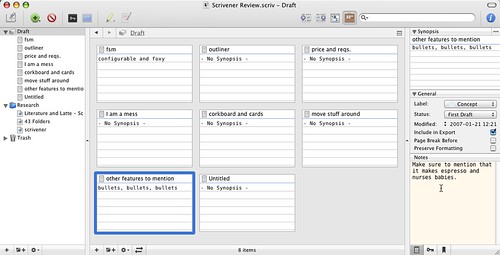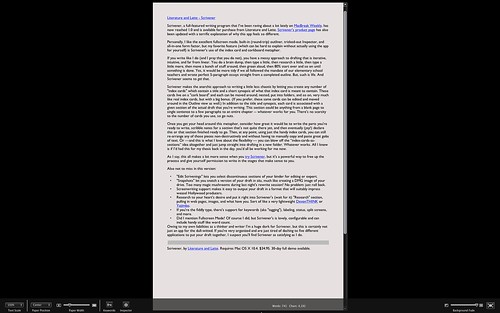
Scrivener: Powerful OS X app for writers: "
Literature and Latte - Scrivener
Scrivener, a full-featured writing program that I’ve been raving about a lot lately on MacBreak Weekly, has now reached the 1.0 milestone and is available for purchase from Literature and Latte. Scrivener’s product page has also been updated with a terrific explanation of why this app feels so different.
Personally, I like the excellent fullscreen mode, built-in (round-trip) outliner, tricked-out Inspector, and all-in-one form factor, but my favorite feature (which can be hard to explain without actually using the app for yourself) is Scrivener’s use of the index card and corkboard metaphor.
If you write like I do (and I pray that you do not), you have a messy approach to drafting that is iterative, intuitive, and far from linear. You do a brain dump, then type a little, then research a little, then type a little more, then move a bunch of stuff around, then groan aloud, then 80% start over and so on until something is done. Yes, it would be more tidy if we all followed the mandate of our elementary school teachers and wrote perfect 5-paragraph essays straight from a completed outline. But, such is life. And Scrivener seems to get that.
Scrivener makes the anarchic approach to writing a little less chaotic by letting you create any number of ‘index cards’ which contain a title and a short synopsis of what that index card is meant to contain. These cards live on a ‘cork board’ and each can be moved around, nested, put into folders, and so on, very much like real index cards, but with a big bonus. (If you prefer, by the way, these same ‘cards’ can be edited and moved around in the Outline view as well.) In addition to the title and synopsis, each card is associated with a given section of the actual draft you’re building. This section could be anything from a blank page to a single sentence to a few paragraphs to an entire chapter — whatever works for you. There’s no scarcity to the number of cards you use, so go nuts.
Once you get your head around this metaphor, consider how great it would be to write the parts you’re ready to write, scribble notes for a section that’s not quite there yet, and then eventually (yay!) declare this or that section finished and ready to go. Remember, at any point, using just the handy index cards, you can still re-arrange any of those pieces non-destructively and without having to manually copy and paste great gobs of text. Or — and this is what I love about the flexibility here — you can blow off the ‘index-cards-as-sections’ idea altogether and just jump straight into drafting in a new folder. Whatever works. All I know is if I’d had this for my thesis back in the day, you’d all be working for me now.
As I say, this all makes a lot more sense when you try Scrivener, but it’s a powerful way to free up the process and give yourself permission to write in the stages that make sense to you.
Also not to miss in this version:
- ‘Edit Scrivenings’ lets you select discontinuous sections of your binder for editing or export.
- ‘Snapshots’ let you snatch a version of your draft in situ, much like creating a DMG image of your drive. Too many magic mushrooms during last night’s rewrite session? No problem: just roll back.
- Screenwriting support makes it easy to output your draft in a format that will suitably impress weasel Hollywood producers.
- Research to your heart’s delight and shunt all the results right into Scrivener’s (wait for it) ‘Research’ section, pulling in web pages, images, and what have you. Sort of like a very lightweight DevonTHINK or Yojimbo.
- If you’re the fiddly type, there’s support for keywords (aka ‘tagging’), labeling, status, split screens, and more.
- Oh, and did I mention the Fullscreen Mode? Of course I did, but Scrivener’s version of this is lovely, configurable and can include handy stuff like word and character count as well as level of opacity to your preferred blackout.
My only substantial {complaint}[TG] about Scrivener so far is that it’s maybe not ideal for fast web writing. Although it has many configurable export options, I haven’t found an easy way to export super-simple plaintext or html that still honors the formatting and links you created back in the app’s native RTF style. The HTML it does put out can be pretty janky, littered with the kinds of whacky SPAN and P styles you’d get in Front Page’s dolorous heyday. (Correct me if I’m wrong on this, Keith, et al.)
Owing to my considerable liabilities as both a thinker and writer, I’m already a huge dork for Scrivener. But be assured that this is certainly not an app exclusively for employment by the dull-witted. Even if you’re already an organized thinker but are just tired of dashing to five different applications to tape your draft together, I suspect you’ll find Scrivener as satisfying as I have.
Scrivener, by Literature and Latte. Requires Mac OS X 10.4. $34.95. 30-day full demo available. Download now.
apple macs os x, applications, creativity, macintosh, os x, reviews, scrivener, writing
Thanks for reading 43 Folders.
Learn more about 43f Sponsorships.
(Via 43 Folders.)


No comments:
Post a Comment